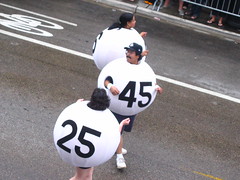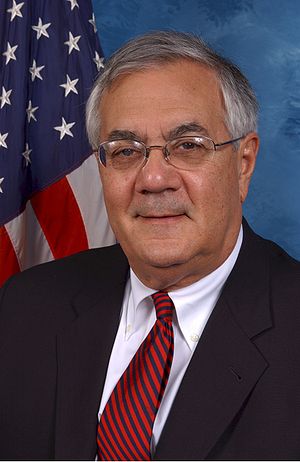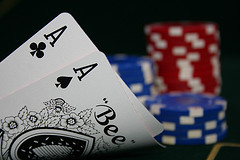
- Image by RcktManIL via Flickr
States can no longer ignore the revenue generated from internet gambling and online Canadian casinos. Lawmakers are taking the lead by consulting with the US Department of Justice (DoJ) to explore the possibility of expanding their lottery to include online gambling.
Proposed legislation in Illinois aims to expand gambling in bars and legalize video machines. Additionally, there is a proposal to allow off-track betting on horse races. Illinois lawmakers have also introduced controversial legislation that would permit residents to play the lottery from home by accessing the internet and selecting numbers electronically.
Challenges Faced by State Lotteries in Online Gambling
While other states offer internet lottery options through subscriptions, these require residents to play the same numbers every month. Until 2006, these states faced no issues with this form of internet gambling. However, the passage of the Unlawful Internet Gambling Enforcement Act created confusion as it prohibited online gambling without specifying which forms were illegal. Financial institutions were burdened with determining the legality of transactions.
Consequently, state lotteries faced problems as credit card companies started refusing payment for subscriptions, fearing legal implications. The affected states have since filed lawsuits to compel credit card companies to pay these charges and stop blocking residents from accessing lottery subscriptions.
Critics of online lottery gambling in Illinois argue that the generated funds would not justify changing state law. However, proponents await the DoJ's opinion before deciding whether to proceed with the legislation.
Interesting Facts about Lotteries
Lotteries have a long and captivating history, with their roots tracing back to the Han Dynasty in China around 205 BC, where they were used to finance major government projects like the Great Wall. In fact, the word "lottery" comes from the Dutch word "lot," which means "fate" or "luck".
In the United States, lotteries have played a crucial role in shaping the nation. The Continental Congress used lotteries to fund the Revolutionary War. Later, in the 19th century, lotteries were used to finance public infrastructure, including the construction of colleges and canals.
Interestingly, voluntary taxation from lotteries contributes significantly to state revenues today. For example, in Fiscal Year 2019, U.S. lottery sales totaled $81.6 billion, generating $23.9 billion in gross revenues for the states.
It is not uncommon for lottery jackpots to reach astronomical figures. The largest lottery prize ever won on a single ticket was a $1.586 billion Powerball jackpot claimed in 2016. However, the odds of winning such a jackpot are incredibly slim, often compared to getting struck by lightning. Yet, the allure of winning big continues to attract millions to participate in lotteries every year.
Online roulette | Free money no deposit | Real money casino | Free no deposit casino bonus codes | Casino free spins | Best no deposit slots | Free casino bonus without deposit | Site poker online | No deposit bonus poker sites | Bet365 poker welcome bonus | Casino euro | Best no deposit bonus online casino | Free slots | Royal ace casino no deposit bonus codes | Casino real money no deposit | Roulette bonus | Blackjack welcome bonus | Real money poker app android | Slot real | No deposit bonus | Virtual casino | Pokerstars blackjack | Online pokies real money | Captain jack casino no deposit bonus codes | Spin and win free spins | Black lotus casino no deposit bonus codes | Free 10 no deposit | Starburst free spins | Best android casinos | No deposit poker bonuses | New online casino | Free online roulette game | Pokerstars real money | Best online live blackjack casino | Majestic slots casino | Liberty slots no deposit bonus | Roulette online | Mobile casino no deposit bonus | New slot sites no deposit bonus | Silver oak casino no deposit bonus codes | 50 free spins fluffy favourites | Online gambling blackjack | Online roulette real money | Casino roulette wheel for sale | Best mobile casino no deposit bonus | Lsbet casino | Real money casino app | Bet casino | Online poker gambling real money | Free spins no deposit required keep your winnings | William hill mobile casino | Casino blackjack online | Myjackpot casino | Free money online poker | Online mobile slots | Casino online no deposit bonus codes | 120 free spins for real money | Casino classic no deposit bonus | Online poker home games | Bingo no deposit bonus | No wagering casino | Best mobile blackjack game | Party poker new player bonus | No deposit bonus codes | Play live roulette online | Poker play online real money | Slot games no deposit | New casino sites no deposit | Casino mobile online | Best poker gambling sites | Raging bull casino free spins | Slots blackjack | Top game casino no deposit bonus codes | No deposit bonus casino | European roulette vip | Mobile slots | Top blackjack players | Mobile casino free bonus | Best online poker sites | Online casino welcome bonus | Slot apps that pay real money | Online slot games no deposit bonus | Real money poker | Casino bonus


 Now that there’s a marked shift toward legalizing many forms of
Now that there’s a marked shift toward legalizing many forms of 
 Aficionados of online casino gambling in general and online poker in particular will now have to wait until June 1, 2010, to see their fate in the United States. December 1, 2009, was supposed to be the deadline for implementation of the
Aficionados of online casino gambling in general and online poker in particular will now have to wait until June 1, 2010, to see their fate in the United States. December 1, 2009, was supposed to be the deadline for implementation of the 









